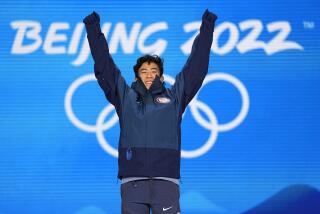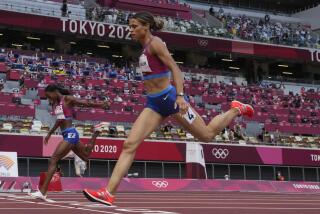Mishap by Chinese Pair Tested Scoring System
Her fall was ungainly, her distress heart-rending.
China’s Zhang Dan and Zhang Hao, the last couple to skate in Monday’s pairs figure skating finale, planned a big opening move. It was a throw quadruple salchow, in which Zhang Hao would launch Zhang Dan into the air to make four quick, tight turns before landing.
They’d completed it only once in competition, but they needed 139.77 points to pass Russia’s Tatiana Totmianina and Maxim Marinin for the gold medal, more points than they’d ever scored in a long program.
It started well. Zhang Hao flung her skyward. She turned and turned and turned and turned -- but lost her edge on the landing and did an awkward split. Unable to stop, she slid backward into the boards as a hush blanketed the Palavela arena 38 seconds into their routine.
“We are challenging the extreme of the human being,” Zhang Dan later said through an interpreter. “We are doing four turns in the air, you saw me hit the board, you can imagine the level of pain.”
Zhang Dan flexed her left knee when she stood, and the crowd applauded as she glided to the skaters’ entrance for treatment. After a trainer administered to her, she skated around a bit to test it. Because the duo couldn’t immediately resume, the referee had to decide whether they’d get two minutes to regroup.
Referee Hely Abbondati of Finland granted them the respite and they picked up where they’d left off, completing their routine well enough to win the silver ahead of Chinese pair Shen Xue and Zhao Hongbo.
“I congratulate them on this result,” Zhao said. “I think they took a lot of risks.”
The risk to Zhang Dan lay in not finishing and perhaps not knowing then if she had the strength to face adversity.
“It is a very valuable experience of competition, and it is so important for myself,” she said. “I made a mistake in the first element, but I thought, ‘I can do the other elements.’ ”
The International Skating Union said Tuesday that Abbondati had correctly followed procedure and that the two-minute period had begun when she told the pair that they’d be able to resume. That defused any controversy before it could blossom.
That Zhang Dan and Zhang Hao, who are not related, won the silver medal wasn’t controversial, either. The new scoring system, adopted after a vote-swapping scandal rocked the Salt Lake City Games, worked in their favor. So did mistakes made by some of the couples who’d preceded them.
Under the new system, skaters get a score for their performance of jumps, spins and other moves, called the “total element score.”
They also get a mark for artistry, called the “program component score.” Totmianina and Marinin had the top scores in each category, 69.51 and 66.33. Zhang and Zhang had the second-best total element score, 66.19, but merely the fifth-best program component score, 59.82.
Totmianina and Marinin won with 204.48 points, followed by Zhang and Zhang, with 189.73 and Shen and Zhao with 186.91. Pang Qing and Tong Jian of China were fourth, with 186.67.
“I believe it was a correct result,” said Charles Cyr of Palm Desert, a technical specialist and architect of the scoring system. “You could say maybe that the component scores were a little bit high, that the judges emotionally said, ‘Let’s give them a couple of sucker points.’ But it was a pretty amazing feat of athleticism.”
In the point-based system, they earned 8.01 points for their next element, side-by-side double axel-triple toe loop combinations, and picked up points for intricate lifts, a triple twist, and spins that were deemed Level 3 or 4, the highest according to the new standards. That allowed them to compensate for getting 2.5 points for the ill-fated throw quadruple salchow instead of the 7.5 they would have earned had they succeeded.
“No fall will preclude anyone from winning a medal,” Cyr said. “The other elements they completed were so good, and they got mostly pluses on their grade of execution. [The fall] did mar the program and mar the component scores. I would have been more concerned if they’d come in second in components.”
For Zhang and Zhang, second place was as good as a victory.
“I’m very satisfied with this silver medal,” Zhang Hao said. “We clearly suffered for it. I’m proud of her for being so brave and finishing the competition. This is a beautiful moment for us.”
More to Read
Go beyond the scoreboard
Get the latest on L.A.'s teams in the daily Sports Report newsletter.
You may occasionally receive promotional content from the Los Angeles Times.






